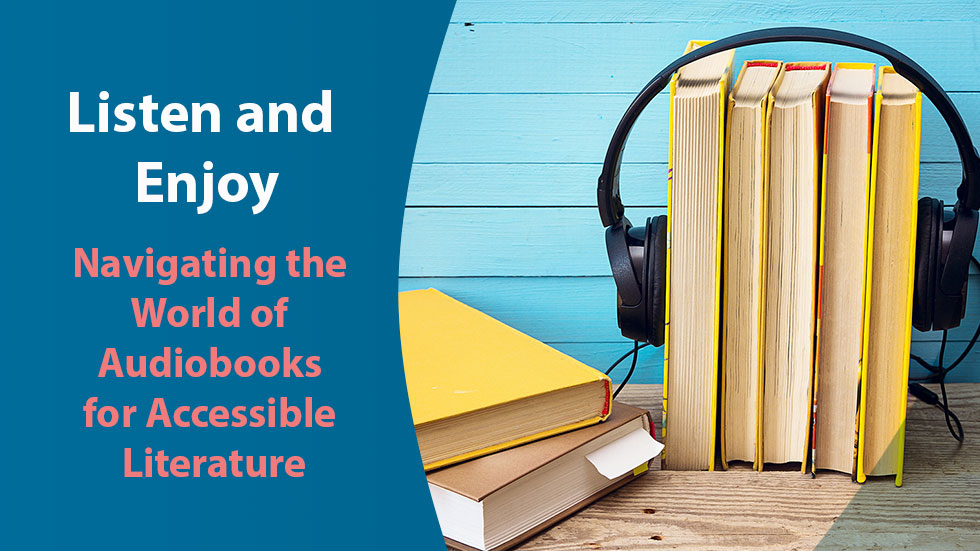
In today’s fast-paced digital world, audiobooks have emerged as a popular and accessible alternative to traditional reading. For visually impaired individuals or those who find reading print challenging, audiobooks offer a unique way to engage with literature, learn new information, and enjoy storytelling. This blog explores the benefits of audiobooks, tips for finding your favorite reads, and resources to enhance your listening experience.
The Benefits of Audiobooks
Accessibility: Audiobooks break down barriers for visually impaired readers, allowing them to enjoy a wide range of books and materials that might otherwise be difficult to access.
Convenience: Audiobooks can be enjoyed anytime, anywhere—whether you’re commuting, exercising, or doing household chores. This flexibility makes it easy to fit reading into a busy lifestyle.
Enhanced Engagement: With professional narrators bringing stories to life, audiobooks can enhance the emotional experience of the narrative, making characters and plots more relatable and vivid.
Multitasking: Audiobooks allow you to absorb information while engaging in other activities, making them an excellent choice for those who want to maximize their time.
Learning Aid: For individuals with learning disabilities, audiobooks can help improve comprehension and retention by allowing readers to hear the text being read aloud.
How to Find Your Favorite Audiobooks
Explore Audiobook Platforms: Several platforms specialize in audiobooks, offering vast libraries to choose from. Popular services include:
- Audible: A leading audiobook subscription service with a diverse collection, including bestsellers and exclusive content.
- Google Play Books: Offers a variety of audiobooks for purchase, often without a subscription.
- Apple Books: Provides access to audiobooks across various genres, available for purchase or rental.
- Libby and OverDrive: Connect with your local library to borrow audiobooks for free. These apps allow you to borrow digital content easily.
Consider Accessibility Features: Look for platforms that offer user-friendly interfaces and features specifically designed for visually impaired users, such as adjustable playback speed, voice commands, and bookmarks.
Read Reviews and Listen to Samples: Before committing to a purchase or subscription, check out reviews and listen to sample clips of audiobooks. This can help you gauge the narrator’s style and whether it aligns with your preferences.
Join Audiobook Communities: Online forums, social media groups, and dedicated audiobook websites can connect you with other audiobook enthusiasts. Sharing recommendations and experiences can lead you to hidden gems and new favorites.
Utilize Recommendations: Many platforms provide personalized recommendations based on your listening history. Pay attention to these suggestions, as they can introduce you to new authors and genres.
Tips for an Enhanced Listening Experience
Set the Right Environment: Choose a quiet space where you can fully immerse yourself in the audiobook. Minimize distractions by turning off notifications and finding a comfortable spot to listen.
Take Breaks: If you’re listening for an extended period, take short breaks to reflect on the material. This helps retain information and enjoy the story more fully.
Adjust Playback Speed: Most audiobook platforms allow you to adjust playback speed. Experiment with different speeds to find what works best for you.
Engage with the Material: Consider taking notes or discussing the audiobook with friends or online groups. Engaging with the material can deepen your understanding and enjoyment.
Mix Genres and Formats: Don’t be afraid to explore different genres or types of audiobooks, such as memoirs, self-help, or fiction. Mixing formats, like combining audiobooks with physical or e-books, can enhance your reading experience.
Resources for Accessible Audiobooks
National Library Service for the Blind and Print Disabled (NLS): This U.S. government service provides free access to audiobooks and other reading materials for eligible individuals.
Bookshare: An online library offering free access to audiobooks for individuals with documented disabilities. Bookshare has a vast collection of titles across genres.
Learning Ally: A nonprofit organization that provides audiobooks and educational resources for students with visual impairments and learning disabilities.
Librivox: A volunteer-driven project offering free public domain audiobooks, allowing you to explore classic literature and historical texts.
Local Libraries: Many libraries offer audiobooks in various formats, including CDs and digital downloads. Check with your local library for available services and resources.
Conclusion
Audiobooks have revolutionized the way we consume literature, making it more accessible and enjoyable for everyone, especially visually impaired individuals. By exploring various platforms, engaging with communities, and utilizing available resources, you can find your favorite reads in an accessible format. Embrace the world of audiobooks and let your imagination soar as you dive into captivating stories and enriching content, all while enjoying the flexibility and convenience that audiobooks offer. Happy listening!





